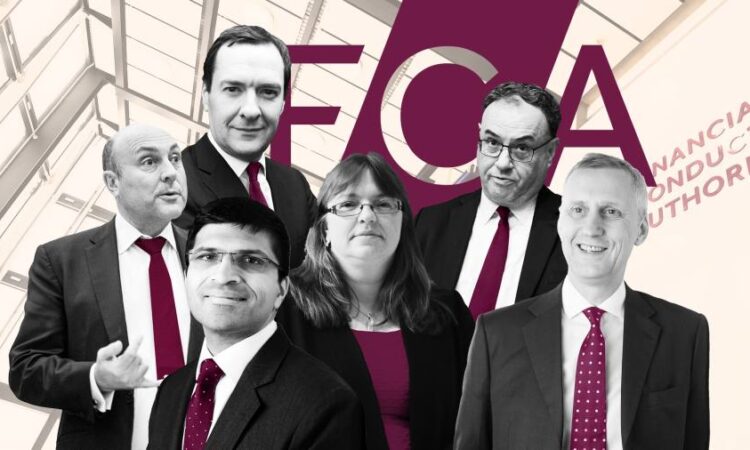
The 2008 financial crisis was a calamity for many, but for David Cameron and George Osborne, then leaders of the UK’s Conservative opposition party, it was also an opportunity.
As the collapse of Lehman Brothers sent shockwaves through global finance and the UK nationalised several banks, Osborne devised a plan to dismantle the regulatory structure created by the ruling Labour party and centred around the “super-regulator” Financial Services Authority.
Upon becoming chancellor of the exchequer following the 2010 election, he put the plan into practice. James Sassoon, the former civil servant charged with creating the blueprint, says it was clear ahead of the crisis that “the division of responsibility for identifying problems, and where the tools were to resolve them, that [set-up] was not working.”
The FSA was abolished. In its place came two regulators: the Prudential Regulation Authority, which sits under the Bank of England and oversees banks and insurers big enough to pose a threat to the wider financial system if they were to fail; and the Financial Conduct Authority, which is accountable to the Treasury and parliament, and regulates the wider financial services industry.
But in the 10 years since Osborne’s “twin peaks” regulatory regime commenced operation in April 2013, both the successor regulators he created have faced accusations that their risk aversion is hobbling the City’s efforts to carve out a post-Brexit future.
The FCA, which regulates the day-to-day behaviour of more than 60,000 firms ranging from spread betting companies to pension providers and high-street lenders, has faced questions about its operational effectiveness as its remit continually expanded.
“I think the FCA’s [task] is genuinely quite a lot more difficult because it’s so broad, and also because of the repeated habit of governments and parliament of handing it other stuff,” says Sam Woods, the chief executive of the PRA.
Woods, who sits on the FCA’s board, has also had run-ins with Westminster; this year, he and Bank of England governor Andrew Bailey argued that planned changes to the regulation of insurers would increase the chances of a taxpayer-funded bailout. Ministers have indicated they intend to proceed with the reforms anyway. “In the end the government just wasn’t persuaded,” says Woods, who denies the episode put the regulator’s independence at risk. “If that did start happening repeatedly . . . I think you’d have a problem, but I’m not expecting it to,” he tells the Financial Times.
But both he and FCA chief executive Nikhil Rathi have indicated that they intend to continue to speak truth to power when they feel it is required.
“What’s important for [the FCA] to do is to explain where something falls within our remit, and where we see some tension with our objectives, just to explain that thoughtfully and carefully,” Rathi tells the FT.
Last year’s crisis among pension funds employing liability-driven investment strategies, along with the more recent rescue of Credit Suisse and the travails of various midsized US banks, have reminded politicians that excessive risk and poor management have not disappeared from the financial system.
After 10 years in operation, the financial industry’s watchdogs are still learning to navigate the delicate path between supporting growth and guarding against repeats of past scandals.
Political from the start
Howard Davies, a previous chair of the FSA, says the creation of two separate regulators “was a political decision” that allowed the Conservatives to blame Labour for the fact that the UK had arguably a worse crisis than other jurisdictions.
Other FSA insiders say the government of the day became very focused on bringing cases against bankers in the aftermath of the crisis, to show voters that miscreants were being held to account.
Woods believes the main motivation for two regulators “was the idea . . . that the conduct side of regulation is extremely voluminous and very noisy and there is a risk that, particularly through good times, [macroprudential regulation] will get submerged”.
But he too acknowledges the political dimension: “There had been a big blow-up. So, yeah, let’s move the deck chairs around, put them into a different shape, and it’ll work better.”
The FCA’s first chief executive was Martin Wheatley, a Briton who had previously run Hong Kong’s securities regulator and who told MPs ahead of taking up the role that he would use the FCA’s early intervention powers to “shoot first and ask questions later” — a phrase that would come back to haunt him.
“Martin Wheatley looked absolutely the right person on paper,” says one person close to the appointment process. “He’d come from the private sector . . . he had a torrid time having to deal with all sorts of markets issues in Hong Kong . . . But for whatever reason it didn’t work out.”
Wheatley pushed through big changes to the regulation of financial advice and mortgages and continued to extract hundreds of millions of pounds of fines relating to past misconduct from banks and other institutions.

“Suddenly the government started taking more of an interest in the FCA, it felt like they saw us as a revenue source,” says Matt Nunan, an FSA and FCA enforcement official from 2007 to 2014, though he stresses that the Treasury never sought to influence individual cases.
But Wheatley’s guilty-until-proven-innocent approach rankled many, and he soon fell victim to a change in political priorities. After the Conservatives won an outright majority in 2015, Osborne sought to normalise relations with the City. By then Wheatley had “burnt through a lot of goodwill very quickly”, recalls one industry insider. “There were not many favours left in the favour bank.”
In the summer of 2015, Osborne told him his contract would not be renewed the following year. Wheatley, who did not respond to a request to be interviewed for this piece, promptly quit.
Another senior official of the day describes the defenestration of Wheatley as “a choice to override independence in order to bring conduct policy into line with political wishes”.
“Wheatley was experienced in market and conduct regulation,” the former official says. “Since then, no FCA CEO or chair has had direct experience of the FCA’s mission until the [latest] chair. Instead, FCA appointments have been approached as though experience in a broadly related field is enough.”
Rathi regards dealing with the politics as part of the job. “We are operationally independent but we don’t live in a vacuum and we must take account of the government’s economic policies . . . And those economic policy priorities can evolve over time,” he says.
The PRA’s Woods adds: “You need to be very clear about your operational independence. But of course, you do work within a wider climate . . . and so as the political tune changes, you need to be aware of that.”
Scope creep
A parallel challenge at the FCA was the expansion of its remit, which had always been planned but nevertheless created problems. The first big addition was consumer credit regulation, previously overseen by the Office of Fair Trading, in 2014. That gave the FCA an extra 35,000 firms to oversee. In the same year, ministers also ordered the FCA to create a standalone regulator for the payments system.
“There was a phase where there was no new task that the government didn’t think it was a good idea for the FCA to get involved,” says Chris Woolard, who joined the FCA as executive director for strategy and competition in 2013 and was its interim chief executive for seven months in 2020.
“[Adding new tasks] was often the right answer, and often continues to be the case, but you could say that it might cause senior management stretch because the organisation is having to manage constant change,” Woolard adds.
Against that backdrop, recruiting a successor to Wheatley was a challenge. “I wouldn’t touch it with a bargepole,” one international regulator who was approached at the time told the FT recently, citing the vastness of the role and the challenging politics.
Tracey McDermott, the FCA’s head of supervision, was installed on a temporary basis before Andrew Bailey, who had been head of the PRA, took over in 2016. Bailey immediately made expectation management a key focus.
Woolard describes a 2016 mission statement as “an attempt to get clarity with the public and politicians around the fact that for the majority of firms, this is not about the kind of continuous supervision a large bank or insurer might have from a prudential perspective”.
The FCA has also assumed new powers to oversee some parts of the fast-growing cryptocurrency industry and in 2021 announced it would introduce landmark consumer protection rules.
As the work piled up, staff vacancies rose and morale worsened; by early 2022, just 33 per cent of staff had confidence in the FCA’s leadership, an internal survey revealed. At one point last year there was a picket line outside the agency’s head office.
The industry complained volubly about delays to authorising firms, activities and staff. “The FCA is swamped with the volume of firms it regulates,” says David Postings, chief executive of UK Finance, a lobby group. “It is a massive operational challenge”.
Key moments in the first decade of the FCA and PRA
September 2012
First FCA chief Martin Wheatley says, ahead of taking up the role, that he plans to “shoot first, ask questions later”
April 2013
FCA and PRA formally created
April 2014
FCA takes on consumer credit, adding 35,000 firms to its remit
2014-2015
FCA gets tough on consumer credit, including crackdown on payday lending
June 2016
Brexit vote puts extra workload on the FCA and PRA
October 2016
New FCA chief Andrew Bailey in his mission statement tries to tame expectations of the regulator, while pledging transparency
june 2019
Collapse of the Woodford Equity Income fund brings criticism of FCA inaction
December 2020
Independent review into minibonds scandal finds FCA “did not effectively supervise and regulate”
july 2021
FCA signals it will introduce “Consumer Duty” rule despite widespread concerns about implementation
December 2022
FCA given new powers to regulate parts of the cryptocurrency industry; is praised for approach as many registration applications turned down
JULY 2022
Public accounts committee criticises FCA for allowing “pension switching” that left former British Steel employees worse off
SEPTEMBER 2022
Brief crisis as pension funds using LDI strategies face heavy margin calls
FEBRUARY 2023
Ministers say they will press ahead with Solvency II reform despite PRA warning that it could increase risks
MARCH 2023
Silicon Valley Bank implodes, PRA says the UK’s swift handling of failure shows how well the regulatory structure works
Such hold-ups have been “hugely damaging”, one financial adviser says, adding that deals have fallen through because approvals could not be processed in time. City minister Andrew Griffith has publicly admonished the FCA over its operational efficiency.
The FCA was also heavily criticised for inadequate supervision of London Capital & Finance, which collapsed in 2019 leaving investors out of pocket, and its failure to prevent the implosion of Neil Woodford’s flagship equities fund, which found itself unable to liquidate large positions in unquoted stocks quickly enough to repay its investors.
The minutes of FCA board meetings from late last year show internal concerns about how stretched the organisation was becoming, with one noting the need for “clear communication” with the Treasury around “the FCA’s capability and support” in respect of the future regulatory framework that will underpin the UK’s post-Brexit approach to rulemaking.
The Brexit dimension
The UK’s decision to leave the EU created an immense amount of work for both regulators but also inexorably altered the UK’s status in the global financial regulation world order and intensified the politicisation of regulation.
Successive UK governments and a significant number of MPs pushed for a “Brexit dividend” to free the City from what they regarded as Brussels’ shackles and to embrace a more growth-focused regulatory regime.
“Where the government wants to go now is different to where it wanted to go when it appointed some of these people,” another senior City executive says, adding that the “government hasn’t helped itself. We’ve had a lot of governments, a lot of different chancellors”.
Miles Celic, head of lobby group TheCityUK, says both the FCA and the PRA need a cultural shift away from the “excessive risk aversion” that seems to be driving them to “eliminate every form of risk from the system and indeed from society and the economy”.
It was this tension that led to the bust-up between the PRA and ministers over the arcane issue of Solvency II, a set of rules that apply to large insurance companies. The Treasury wanted to loosen the rules so insurers could invest more of their assets in infrastructure projects; the BoE wanted to tighten up another area of the regime.
But the PRA and the BoE warned the move would increase the risk of pension providers going bust. Woods describes the issue as “an item that we considered . . . important enough to argue that point in a climate that was obviously not going to be favourable . . . and to take that point a very long way”.
Postings argues that the FCA’s forthcoming consumer reforms, which require the industry to deliver “good outcomes” for clients, could lead to less choice for customers as firms pull back products that could fall foul of the rules.
Another senior City figure says the consumer duty is part of a broader push that will make the UK less competitive, adding that he has told Prime Minister Rishi Sunak that “regulators are going in a different direction to your direction, and I think the industry would like to see some more accountability to parliament”. Even Griffith has privately expressed fears they may lead to spurious compensation claims.
A recent reprieve
For all the criticism, both regulators have notched up some wins in recent months. The often-critical Treasury select committee praised the FCA’s cautious approach to cryptocurrency — it declined to approve 85 per cent of those who applied to be included in the UK’s crypto register even as the government talked of making London a crypto hub.
In January, the FCA appointed a generally respected chair in the shape of Ashley Alder, a lawyer who, like Wheatley, previously headed Hong Kong’s financial regulator. Meanwhile Rathi, a former Treasury official and London Stock Exchange executive appointed in 2020 after Bailey was made governor of the BoE, has whittled down the number of pending authorisations to 5,000 from a high of 12,500.
He says most of the delays are down to genuine regulatory concerns about the applications — and promises to be “much more forthright and much more public about saying that” in future.
Rathi has also appointed a transformation director to implement a plan to use data more effectively and says it is now using data “on an industrial scale”, for instance intervening in financial promotions 8,000 times last year — a thirteen-fold increase on its 2021 tally.
Some political pressure has also eased. A plan mooted by Liz Truss ahead of her brief premiership to fold the FCA back into the PRA appears to have found no favour with her successor, while a separate proposal to allow government to veto regulatory decision-making has also been abandoned.
Woods says the PRA has overseen a rebuilding of banks’ capital levels and that “the political wind was in our sails for most of that journey”. But recently the climate has become more deregulatory “and that introduces a bit of tension”.
“So . . . one needs to be sensitive to those things and you’re trying to navigate them as intelligently as you can.”
Harriett Baldwin, the Conservative chair of the Treasury select committee, acknowledges that some differences of opinion between regulators and their political masters are inevitable. “Those can be thrashed out privately, occasionally they will come into the open,” she says. She would prefer the former route: “What you want people to observe is an economy that is firing on all cylinders in terms of the role of the government, the role of regulators and the role of the private sector”.
Rathi says that for all the challenges, the FCA has “played a central role in managing through the extraordinary market events, crises, we’ve seen,” and points out that the regulator should be judged as much by what has not happened as by what has.
“When things go wrong, there’s obviously a lot of focus on the regulator,” he says. “Everything that goes right, and that is prevented, it goes off unspoken and unnoticed.”









